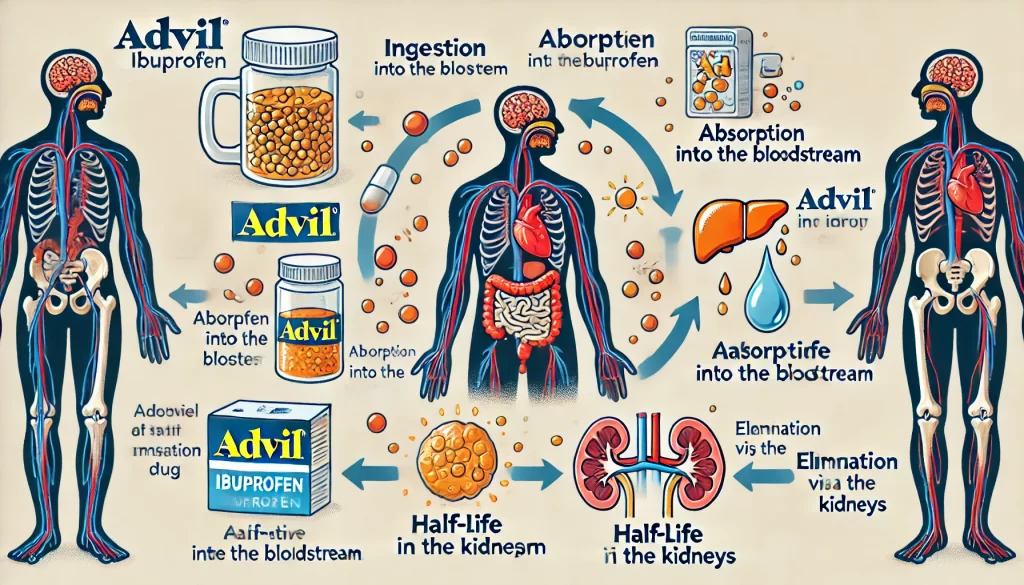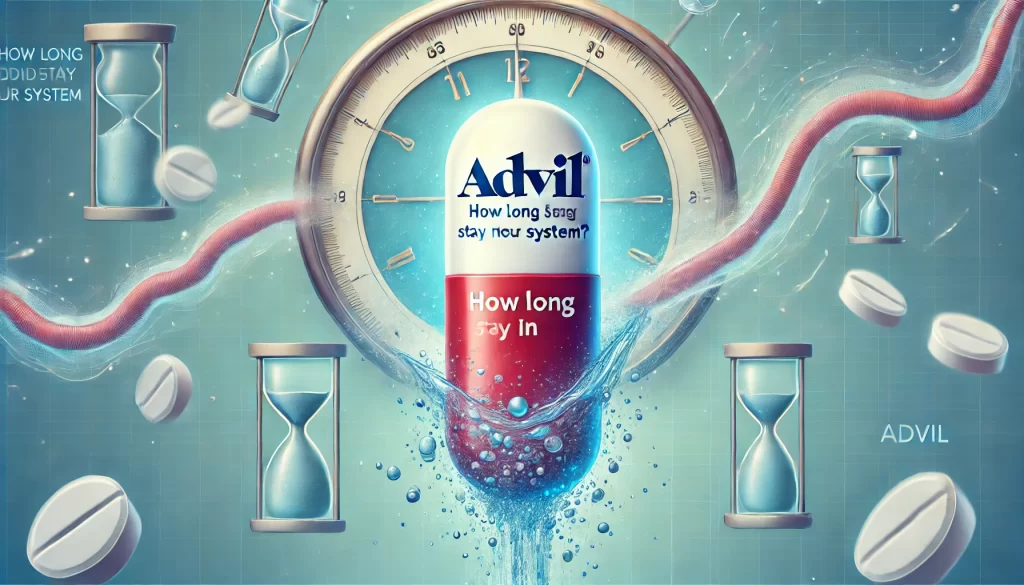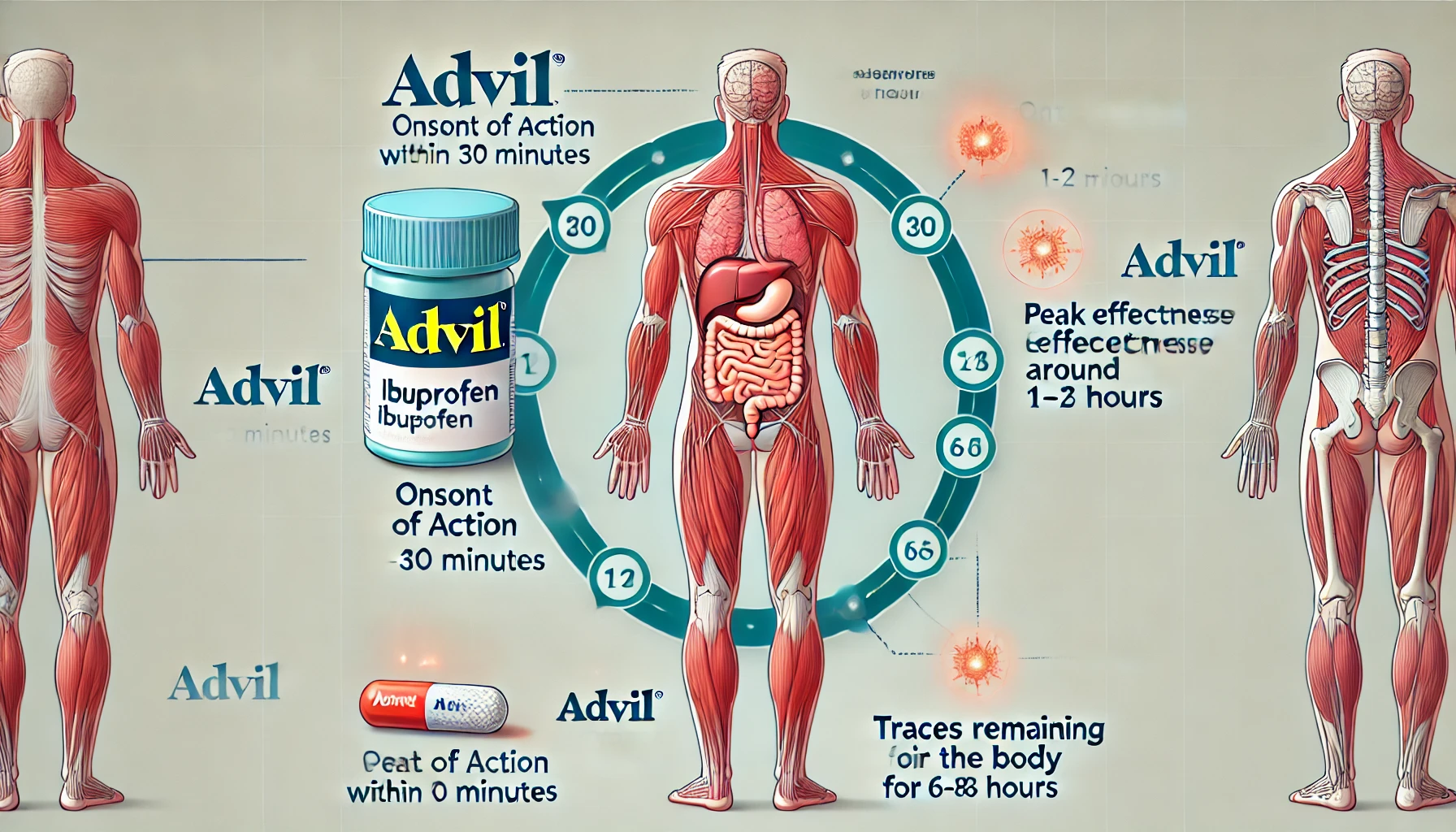Table of Contents
When you take Advil to relieve pain or reduce fever, you might wonder, “How long does Advil stay in your system?” It’s critical to comprehend this in order to manage side effects, avoid any drug interactions, and determine when to take your next dose. In this article, we’ll dive into how Advil works in your body, how long it lingers, and what factors affect its duration in your system.
What Is Advil and How Does It Work?

Advil is a well-known over-the-counter pain reliever commonly used to reduce pain, inflammation, and fever. Ibuprofen, a nonsteroidal anti-inflammatory medication (NSAID), is its active component. Advil blocks the production of certain chemicals in your body that cause inflammation and pain. But once you’ve taken it, how long does Advil stay in your system?
How Long Does Advil Take to Work?
Advil is absorbed relatively quickly into your bloodstream. Typically, you will start feeling relief within 30 minutes to 1 hour after taking the recommended dose. The pain-relieving effects usually last 4 to 6 hours, depending on factors like your age, health, and the dose.
How Long Does Advil Stay in Your System?

How long does Advil stay in your system depends on various factors, such as dosage, metabolism, and individual health conditions. On average, Advil stays in your body for around 6 to 8 hours. However, traces of Advil, specifically its active ingredient ibuprofen, can remain detectable in your system for a longer period.
Advil’s Half-Life: What Does It Mean?
The term “half-life” refers to the time it takes for the concentration of a drug to reduce by half in your bloodstream. For Advil, the half-life is approximately 2 hours. This means that after 2 hours, half the dose of Advil has been processed by your body. After 4 hours, about a quarter of it remains, and so on.
Even though you may not feel the effects after 6 to 8 hours, some small amounts of Advil may still be in your system. However, these small traces are unlikely to cause any effects or harm unless taken in extremely high doses.
Factors That Affect How Long Advil Stays in Your System
Not everyone’s body processes Advil the same way. Several factors influence how long Advil stays in your system:
1. Dosage
The amount of Advil you take can influence how long it remains in your system. A higher dose may take longer for your body to break down and eliminate.
2. Age
Older adults may process medications slower than younger individuals. This is because kidney and liver functions can decrease with age, leading to longer processing times for Advil and other drugs.
3. Kidney and Liver Function
Advil is processed mainly by the liver and excreted by the kidneys. If you have kidney or liver issues, it may take longer for your body to eliminate Advil, potentially prolonging its presence in your system.
4. Metabolism
Medication is often processed more quickly by persons with faster metabolisms than by those with slower metabolic rates. Factors like exercise, diet, and genetics play a role in your body’s metabolic rate.
5. Overall Health
General health, hydration, and whether you have other health conditions can impact how long Advil stays in your system. For instance, dehydration may slow down how quickly your body can eliminate the medication.
6. Frequency of Use
If you take Advil regularly or for an extended period, it may build up in your system and take longer to be fully eliminated. This is why it’s important to follow recommended dosing guidelines and avoid overuse.
How Long Does Advil Stay in Your Blood, Urine, and Saliva?
In Your Blood
Advil is usually detectable in your blood for about 24 hours after you take it. However, after 6 to 8 hours, the levels in your blood are minimal and should not have any significant effects.
In Your Urine
Advil can be detected in urine for 1 to 2 days, depending on the dose and individual factors like metabolism. If you’re undergoing drug testing, ibuprofen is not commonly included in routine tests. However, certain high-sensitivity tests can detect ibuprofen in urine.
In Your Saliva
Advil can stay in your saliva for up to 2 hours after ingestion. It is absorbed and metabolized quickly so that it won’t remain in your saliva for long. After a few hours, it becomes undetectable.
How Long Does Advil Stay in Your System After Long-Term Use?
If you use Advil regularly for long periods, your body may take longer to eliminate it. Continuous use can result in the drug accumulating in your system. This is why doctors recommend taking NSAIDs like Advil only for short-term use unless otherwise directed by a healthcare provider. Regular use can also increase your risk of side effects, such as stomach ulcers, kidney damage, and heart problems.
Potential Side Effects of Taking Advil
While Advil is generally considered safe when taken as directed, it’s important to be aware of potential side effects, especially if you take it regularly or in high doses.
Common Side Effects
- Stomach upset or pain
- Nausea
- Headache
- Dizziness
Serious Side Effects (Less Common)
- Stomach ulcers
- Kidney damage
- High blood pressure
- Reactions to allergens (such as rash or trouble breathing)
Get in touch with your doctor right once if you encounter any serious side effects. It’s important to use Advil only as directed on the label or as prescribed by your healthcare provider.
Also Read: How Long Does a Viral Rash Last? Shocking Truth Revealed!
How to Safely Use Advil
To avoid any complications and ensure how long Advil stays in your system doesn’t cause harm, here are some tips for safe usage:
- Follow the recommended dosage: Stick to the dosage guidelines provided on the packaging or by your healthcare provider. Don’t take more than is recommended.
- Limit long-term use: Prolonged use of Advil can increase your risk of side effects. Use it only for short-term relief unless advised otherwise by your doctor.
- Stay hydrated: Drink plenty of water while taking Advil, as this can help your body process and eliminate the medication more effectively.
To sum up, how long Advil stays in your system typically depends on factors like age, metabolism, dosage, and overall health. While its effects wear off in about 4 to 6 hours, traces can remain in your body for up to 24 hours or more. By understanding how Advil works and following safe usage practices, you can effectively manage pain without putting your health at risk.
Always consult a healthcare professional if you have concerns about how Advil might affect your system, especially if you take it regularly or have pre-existing health conditions. This way, you can ensure you’re using it safely and effectively for pain relief.




